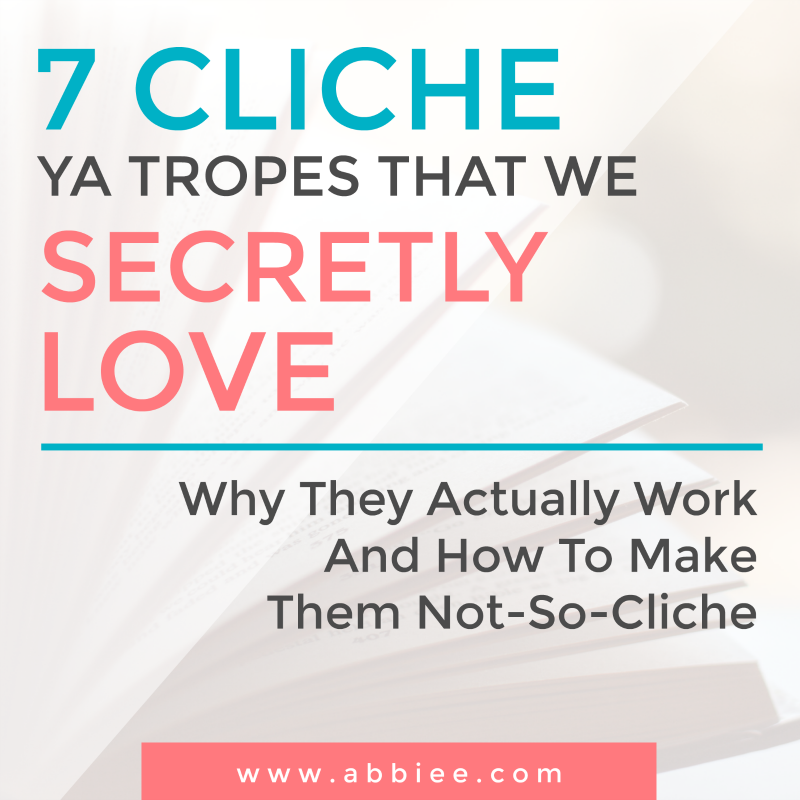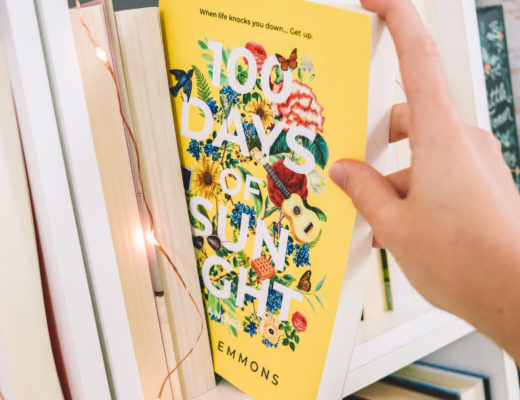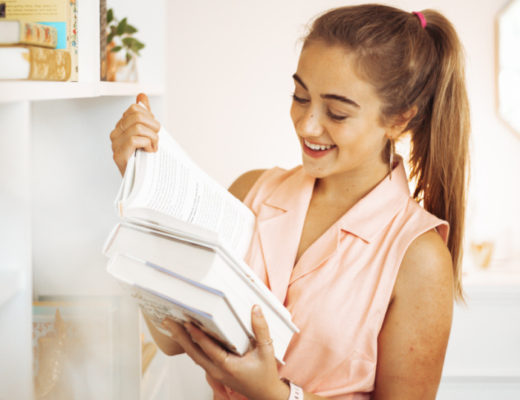Anybody who reads YA fiction knows that IT IS FILLED WITH CLICHES. And anybody on the internet is aware that most YA readers are fed up with these cliches… but ARE we?? If cliches in fiction are so bad, why are so many “cliche” books on the bestseller list?
LEAVE IT TO ME TO QUESTION THE POPULAR OPINION. I’m just curious: are cliche YA tropes REALLY that bad?? What exactly do we hate about them? Is there something fundamentally GOOD about these tropes? Can we use cliches in our writing without it SEEMING cliche? TODAY WE’RE GOING TO EXPLORE ALL THESE QUESTIONS.
Two weeks ago I wrote a post called How To Make “Insta Love” Actually Work In Your Story and I was super pumped with the response it received! Also it was fun to redefine the cliche and explore why insta love isn’t ALWAYS a train-wreck. So this week I’m tackling another cliche — actually, SEVEN OF THEM. (Because I’m extreme with everything haha let’s go skydiving later.)
Why am I talking about this? Because I believe there’s a reason behind everything. I’m also a geek for psychology and I like to crawl inside people’s brains and figure out why they respond to certain things. As writers, we all want to write good stories. And a quick Google search of “cliche ya tropes to avoid” will lend you tons of articles roasting all the most-used plot devices out there. But should we be AVOIDING cliches? Or making them work for us in unexpected ways?
That’s the question I want to answer today. SO LET’S GET ON WITH IT. First up: the cliche we all know and love (but not really)…
1. THE CHOSEN ONE
Also known as “special snowflake” trope, this is pretty easy to spot. Take your main character, add a strange birthmark, throw in an ancient prophesy, give them a mysterious mentor/guide, and send them on their way to destroy The Evil One™ with nothing but their (newly discovered) superpowers. Why is this trope so familiar? Because there are a lot of books with this plot device… and some of them are on the bestseller list.
Why we secretly love this cliche:
I KNOW WHAT YOU’RE SAYING: “I don’t love it, I hate it! It’s overused! It’s cliche!” True… but we can’t ignore the elephant in the room: SO MANY BEST-SELLING YA BOOKS INCLUDE THIS TROPE. Why are we attracted to it?? Because when we read a book, we climb inside the main character’s skin and live vicariously through them. When we read this type of book, WE ARE THE SPECIAL SNOWFLAKE. We experience the conflict, challenge, and responsibility involved in being The Chosen One™…without even getting off our couch. It’s pretty attractive, even if it is overused.

What the opposite looks like:
There is no Chosen One™, just normal people. Anybody can save the world and defeat The Evil One™, but they don’t. Your main character eats doughnuts and plays Candy Crush Saga all day. They don’t feel compelled to save the world or defeat evil. Who wants to read a book about this??? NOT ME.
How to make it not-so-cliche:
You can have an ancient prophesy! You can have a birthmark! You can even have superpowers! But your Chosen One™ shouldn’t be flawless. They need to be HUMAN. People make mistakes, and your special snowflake is no exception. She needs to have a fatal flaw that gets in the way of her own success. She needs to grow and learn through making mistakes and failing. That’s how real life is — we mess up and try again. If she doesn’t give up, that makes her a hero. SIDE NOTE – a story that does this really well: The Blood Race by K.A. Emmons (my freaking awesome sister.)
2. LOVE TRIANGLES
Perfect Girl™ (who thinks she’s ugly) gets to choose between TWO guys who are madly in love with her and probably have a mutual distrust and hatred for one another. One is dark and broody and one is cute and caring OMGGGGG HOW WILL SHE EVER DECIDE??? Why is this trope so familiar? Because there are a lot of books with this plot device… and some of them are on the bestseller list.

Why we secretly love this cliche:
Because we crawl inside the mind of the Perfect Girl Who Thinks She’s Ugly, we get to experience the challenge of making a decision between two people when we’ve PROBABLY NEVER MADE SUCH A DECISION AND PROBABLY NEVER WILL. Wouldn’t it be nice to have two flawless and adorable guys begging you to hang out with them?? Yes and no. There’s the conflict. We’re secretly attracted to the decision-making situation at play here…whether we like it or not.
What the opposite looks like:
Perfect Girl has a boyfriend and is happy with him. End of story. BORING, RIGHT?
How to make it not-so-cliche:
If a love triangle is done well, it can be vastly entertaining to read. And by “done well” I mean: UNPREDICTABLE. But how do you make it unpredictable? MAKE IT REALISTIC. Decision-making is rarely as simple as “do I want to be with a vampire or a werewolf?” More often, we are pulled in a hundred different directions. In real life, there is more to consider than “which boy is cuter.” And we’ll never be able to relate to a girl who can pick between whichever guy she chooses. If you’re going to write a love triangle, make it complicated. Let there be more at stake than the rejected guy’s jealousy. SIDE NOTE – a story that does this really well: Frozen (unpredictable!! And also unconventional because it’s not like “which guy should I choose hmm let me think.”)
3. WHAT DO YOU KNOW, I HAVE SUPERPOWERS!
Nothing spices up a teenager’s mundane life like some RANDOM SUPERHUMAN ABILITIES, RIGHT?? Meet our Unlikely Hero™ who, upon his 16th birthday, realizes that he actually has [insert superpower here] and can defeat the Coming Evil™!!!! AND SAVE THE WORLD!! But nobody knows about his superpowers and when they find out, he’s going to be in big trouble. Oh, and the Coming Evil™ will now be on a mission to destroy him and his family. Why is this trope so familiar? Because there are a lot of books with this plot device… and some of them are on the bestseller list.
Why we secretly love this cliche:
BECAUSE WE WISH WE HAD SUPERPOWERS. I mean, isn’t it obvious?? The superhero plot device never gets old, hence Marvel’s ability to rake in two hundred million dollars every time they release of a new film about a superhero defeating the coming evil. THERE IS NOTHING WRONG WITH THIS CLICHE. Clearly, we enjoy it. And young adults enjoy it even more if said superhero is a young adult, too. We secretly love the adrenaline rush we experience through the eyes of the Unlikely Hero™ as he struggles to control his superpowers and faces the consequences of being different.
What the opposite looks like:
Superheros don’t exist.
How to make it not-so-cliche:
Make your superhero HUMAN, above all else. We can’t relate to an immovable iron fist of power and good intentions. But we can relate to being different. So that’s all it is — on a larger scale. What consequences arise? How does the Unlikely Hero™ deal with them? How does he get in the way of his own success? How does he change and grow and become a better person? WHAT ARE HIS FLAWS??? He definitely needs flaws. Don’t just hit me up with a bunch of action and explosions. I care about what’s happening in his heart and mind. Superhero stories are great — but if you don’t capture me EMOTIONALLY, you don’t capture me at all. SIDE NOTE – a story that does this really well: The Amazing Spider-Man (the first movie…which is actually my favorite Marvel film. A+ backstory and character development.)

4. THIS IS IT, THE APOCALYPSE
Allow me to introduce my dystopian world: we are all divided into separate groups based on some major personality trait or placement in society. I, the Edgy Protagonist™, will make the irreversible choice to change my position in society. BUT THAT’S NOT ALL. I just discovered that I’m different from everyone else and the government wants to kill me. How will I survive omg. < Why is this trope so familiar? Because there are a lot of books with this plot device… and some of them are on the bestseller list.
Why we secretly love this cliche:
Again, we love this because we live vicariously through the Edgy Protagonist™. What if you lived in a dystopian world where the government controlled everything and people were divided and oppressed and you were the only one who saw something wrong with it?? WELL, NOW YOU CAN EXPERIENCE THAT. We get the same adrenaline rush we did with the superhero trope, but this time we’re not just fighting the Coming Evil™ — we’re fighting the system that everyone agrees with. THAT’S PRETTY DARN COMPELLING, ACTUALLY.
What the opposite looks like:
The apocalypse has come and gone. Everyone’s doing alright.
How to make it not-so-cliche:
Make your reader feel EMOTIONALLY connected to your Edgy Protagonist. We can’t relate to or sympathize with big controlling governments… but we CAN relate to people. We are seeing the world through the main character’s eyes — so make us FEEL what she’s feeling. Why is she different? Why does she feel compelled to change the world she lives in? How does she confront her own demons to reach her end goal? These questions take us deeper, inside the heart and soul of the Edgy Protagonist™. It helps us relate to her, root for her, and forget that this whole plot device is highly cliche. SIDE NOTE – a story that does this really well: The Giver by Lois Lowry (allegories, plot twists, deep morals… I like this book a LOT.)
5. THE “STRONG” FEMALE CHARACTER
DON’T GET ME WRONG. I love strong female characters in fiction — girls who aren’t afraid to break a nail, stand up for themselves, and even punch someone in the face. I’M ALL FOR IT. But here’s what most “strong” female characters look like nowadays: “Hi, I’m the Strong Female™ and I can do LITERALLY EVERYTHING a guy can do, including build a house, fix your car, singlehandedly fight off a multiple-assailant attack, and shoot people with an automatic weapon because WHY NOT. I also wear leather jackets, have a bad attitude about everything under the sun, can’t speak without using sarcasm, and generally hate the world. Want to be friends?” NO, ACTUALLY. I DON’T. Why is this trope so familiar? Because there are a lot of books with this plot device… and some of them are on the bestseller list.

Why we secretly love this cliche:
BECAUSE WE WANT STRONG FEMALES IN FICTION!!! The days of “damsel in distress” stories are over. We don’t want Prince Charming to save our girl — we want to see her save herself. It’s also cool to see girls with knowledge in things they are stereotyped as “not knowing about,” like fixing cars and punching people. The dirty, gritty, difficult things aren’t just for guys — girls can do them, too! But…we don’t have to wear leather jackets and hate everyone in order to be viewed as “strong.” Actually, we don’t need to do ANYTHING to prove our strength — we just need to step up when the situation calls for strength.
What the opposite looks like:
Girls are weak and emotional and only interested in painting their nails. < NOT TRUE!!!!!!!!!!!!!!!!!!!!1
How to make it not-so-cliche:
STRONG FEMALE CHARACTERS ARE SO IMPORTANT. But to represent “strong” as a leather-jacket-wearing AR-weilding mean girl is to grossly misrepresent strength. In fact, it makes other girls feel weak — because they like to paint their nails and wear pink dresses. THEY ARE NOT WEAK. Make your female characters capable and ready to step up to the plate… but also let them be female. It’s okay to like girly things!!! Women don’t have to act like men to be strong. WE ARE STRONG JUST BY BEING TRUE TO OURSELVES. SIDE NOTE – a story that does this really well: Worlds Beneath by K.A. Emmons (!!! COMING SUMMER 2018. I had the privilege of beta-reading this book and omg guys it has the best ending ever and Hawk shows amazing strength and courage. I want to be her when I grow up.)
6. THE BAD GUY WHO IS PURE EVIL
“HELLO I AM THE VILLAIN AND I HATE EVERYONE. In fact, it is my soul purpose to destroy everything good and kind about the world. I have no idea why I want to do this, but I do. I will not rest until I have DESTROYED THE WORLD!! FOR NO REASON!! EXCEPT TO GIVE THE PROTAGONIST SOMETHING TO DO!!!” < Why is this trope so familiar? Because there are a lot of books with this plot device… and some of them are on the bestseller list.
Why we secretly love this cliche:
Because good overcomes evil!! And we can’t have THAT trope without a villain. Right?? Well, that depends on what you call a villain. I know there’s all these nuances between “villain” and “anti hero” and “morally grey” — BUT WHATEVER. A BAD GUY IS A BAD GUY. And every good vs evil plot needs a bad guy… or else there wouldn’t be any conflict! Look at what would happen:
What the opposite looks like:
Nothing is wrong. There is no evil, just good people. We all live in harmony and sing Kumbaya around a campfire.
How to make it not-so-cliche:
Villains weren’t always villains. They weren’t born evil — somewhere along the line, they became that way. I’m not saying we have to sympathize with your villain or see anything good about them… but we have to know WHAT WENT WRONG. People aren’t just evil for the sake of being evil. Show me how they got from point A to point B — and if you can’t do that, show me their motive. It has to be something even I can relate to. The reader has to FEEL the villain’s motive as poignantly as we feel the hero’s motive. SIDE NOTE – a story that does this really well: Poldark (If you’ve never seen this show, GO WATCH IT. George Warleggen is an A+ villain. Watching his hatred and jealousy fester is almost as addictive as watching Aidan Turner’s face.)
7. MEET MY DYSFUNCTIONAL FAMILY
Let’s face it — most YA novels have at least one of the following: missing parents, dead parents, or neglectful parents. MAYBE EVEN ALL THREE. Nothing makes a protagonist feel victimized and alone quite like a dysfunctional family unit! And although this adds to conflict to a story, it’s usually just lazy writing/a way to cover up missing information. No need to write a good, complex, interesting family unit when we can just kill off all the relatives! Why is this trope so familiar? Because there are a lot of books with this plot device… and some of them are on the bestseller list.
Why we secretly love this cliche:
Because it’s relatable. Nobody has a perfect family unit — there will always be conflict, disagreements, and problems. But that’s part of life. We can sympathize with characters who have a dysfunctional family, because we relate to them on a small or large scale. BUT FAMILIES TEND TO BE SUPER DYSFUNCTIONAL IN YA FICTION FOR SOME REASON.

Not to say they should be all sunshine and rainbows! After all, that would be boring…
What the opposite looks like:
Every member of the family loves each other and gets along and they never fight about anything. < UNREALISTIC.
How to make it not-so-cliche:
Don’t go overboard! Family issues are intricate and complex — there’s tons of story opportunities here! Don’t just take the easy way out and kill off your protagonist’s parents… unless that serves the story you’re writing. Look for new ways to create “messed up perfection.” We all want a happy family, but we can’t always have that. Everyone is flawed, in one way or another. Show me that. Show me love in spite of flaws, or how your protagonist does the right thing about her family, even if it’s the hardest thing to do. SIDE NOTE – a story that does this really well: Flipped by Wendelin Van Draanen. (This is one of my favorite books of all time!!! And tbh it’s more about family than romance, you should totally go read it like RIGHT NOW.)
HERE’S THE POINT:
NOT ALL CLICHES ARE BAD. If you’ve written a book with any of these tropes or you’re thinking about writing a book with any of these tropes, DON’T BE DISCOURAGED!! Cliches are cliche for a reason. Readers like them! But only if they are done right. And always remember this: your story is unique because there’s nothing else EXACTLY like it in the world. You might be using ingredients that a lot of other writers use, but THIS IS YOUR RECIPE. Never mistake similarities for a lack of originality. DO THE CLICHES AND DO THEM WELL. I believe in you. 😉
TALK, BRO
WOW THIS IS THE LONGEST BLOG POST I THINK I’VE EVER WRITTEN. I’m not sorry. This was probably one of the most fun blog posts I’ve written. What do you think about these cliche YA tropes?? Which one do you hate the most? Can you add to my list? ALSO: give me some good examples of books/movies/shows you’ve ENJOYED these tropes in! LET’S TALK ABOUT CLICHE THINGS. Comment below!
rock on,
abbiee







